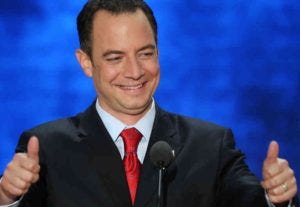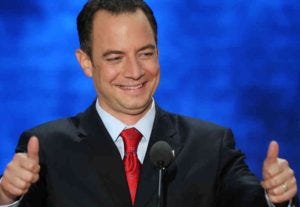On Sunday's Face the Nation, RNC Chairman Reince Priebus suggested that if Donald Trump's primary challengers don't support the GOP presidential nominee, their political futures in the Republican party could be in jeopardy.
As is widely known, a number of Trump's primary opponents haven't offered endorsements (or even tepid support) to his candidacy. Notably among them are Ted Cruz, John Kasich, and Jeb Bush. All could potentially throw their hats back into the presidential ring in 2020 or 2024.
"Those peopled need to get on board," Priebus told host John Dickerson. "And if they're thinking they're going to run again someday, I think that we're going to evaluate the process – of the nomination process and I don't think it's going to be that easy for them."
When asked specifically if the party itself planned to "penalize" these individuals, if they don't make good on their pledge from last summer, to support the eventual nominee, Priebus framed it as a real possibility.
"I think these are the things that our party's going to look at, in the process," he answered. "And I think that people who gave us their word, used information for the RNC, should be on the board."
Preibus referenced a ballot-access issue in South Carolina, where party candidates are actually required to pledge their support to the eventual nominee, in order to get on the ballot...regardless if who that person is.
This wasn't the case, of course, with the "loyalty pledge" that was taken by the Cruz, Kasich, Bush, and 14 others; it wasn't legally binding. Still, Preibus seemed to be suggesting that the South Carolina model had enough merit to be applied to national candidates.
"If a private entity puts forward a process and has agreement with the participants in that process," he added, "and those participants don't follow through with the promises that they made in that process, what should a private party do about that if those same people come around in four or eight years?"
My guess is that Preibus's view actually mirrors popular sentiment among Republican voters. I've been surprised by the number of Trump supporters (even reluctant ones) who have responded to me on this website, and on social media, with the belief that the loyalty pledge is akin to a blood pact – one that must be honored as a show of true character.
I've found that viewpoint quite curious, being that:
Trump disavowed the same pledge back in March.
Trump has broken promises throughout his campaign, whether it be on policies (like immigration), or vows to provide information to the public (like tax returns).
Still, a lot of Republicans in this decisively anti-establishment election are insistent that the losing candidates now swallow their pride, and their concerns for the nation, and hold firm on the promise they made to – yes – The Establishment. And Priebus has become those people's loudest voice.
Talk about irony.
I certainly can't speak for the GOP holdouts, but if I were them, I know what my response would be: "Screw you, Reince."
There was no RNC talk of penalties or demands for party loyalty when Donald Trump was insisting that our nation's last Republican president "lied" about WMDs in Iraq. There was no retribution for when he placed the blame for 9/11 on that president, or for when he likened the administration to war criminals.
Where was the RNC when Trump was waging personal attacks on elected Republican leaders (including some up for re-election) for committing the dastardly act of endorsing other primary candidates? Reminder: We're talking about a guy who later said that he "doesn't mind" if the GOP loses the U.S. Senate.
When Trump compared one of his Republican opponents to a "child molester," why wasn't the RNC issuing him threats? Where was the committee when Trump suggested that another primary opponent's father conspired to assassinate JFK?
Let me repeat that last one: A Republican presidential candidate accused another Republican presidential candidate's father of being involved in the murder of an American president. And the RNC did nothing.
Sure, there have been times when Priebus has publicly stood up to Trump and denounced some of his rhetoric, like when Trump called the Colorado GOP "corrupt." And for that, Priebus deserves some credit. But there were never any public threats issued to Trump about his political future. There was never any talk about the RNC making it hard for him to ever run again.
The RNC took ownership of Trump, and now Priebus is warning others that they'd better debase themselves if they know what's good for them.
He's saying that they have to vouch for a guy who, in some cases, attacked their families. He's telling them that they need to prop up a man who they believe is totally unqualified to serve as president, or else they will suffer political consequences.
In short, Priebus is demanding a show of party loyalty that would have never been (and never will be) demanded of Trump.
Because of that, those who don't want to endorse the Republican nominee shouldn't feel the slightest bit obligated to do so. In fact, they should be insulted by the public pressure now being placed on them.





